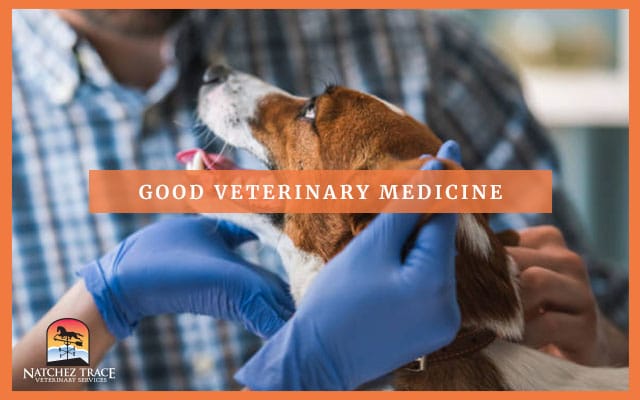I see and hear it all the time: “We practice good veterinary medicine!”
Or, better yet: “Our practice is ‘high quality.'”
When I was in veterinary school, the professors would all tell us: “Make sure you practice good, high quality veterinary medicine!”
Every veterinary journal preaches about “good veterinary medicine.”
At the time, I thought I knew what good veterinary medicine was. It meant running a bunch of tests, client communication, and alleviating animal pain and suffering. Or even worse, it meant following the standards set in human medicine.
Right? No, wrong!!
After years of experience, I now know what defines good veterinary medicine.
What Is Good Veterinary Medicine?
1. Giving options.
Don’t you hate feeling like your veterinarian is only providing you with one, unattractive option to your pet’s health problems? Good veterinary medicine is all about giving owners a variety of different options in treating their pets. Every pet has a unique history to consider when creating a treatment plan. Additionally, each owner’s ability and willingness to take care of his or her pet is different, it only makes sense to offer options.
2. Innovation.
It seems like science and technology are moving at warp speed these days! Veterinary medicine has come a long way in the past 10-20 years. Treatments such as surgery, herbal remedies, chiropractic and acupuncture once seemed impossible to practice on pets. Today, these treatment options are performed on animals every day. To practice good veterinary medicine, physicians need to apply cutting edge options to treat the same old problems.
3. Communication.
When I say that a good veterinarian knows how to communicate, I don’t mean talking about the standard stuff like giving estimates and follow-ups. I am talking about communicating expectations. What does the owner expect from what the veterinarian provides? The ability to communicate and educate owners about expectations of treatments is tough. Why? Because all animals are vastly different. Some dogs respond to treatments and some don’t. Communicating effectively requires intuition, experience, and honesty.
4. Honesty.
Some may think that honesty falls under the category of communication, but I feel it deserves its own. A good vet will be honest with you, whether the information is what you want to hear or not. The information may be a bit hard to swallow at first, but explaining the situation with exact details and treatment options is necessary to give the owner the information needed to decide what is best for his or her pet. Being straightforward has sometimes cost me!!
5. Efficiency.
To practice good veterinary medicine, a physician must run a clinic that is accurate and efficient. This means the veterinarian must choose staff members who are friendly and accurate problem solvers. A clinic that practices good veterinary medicine will return calls and answer emails in a timely fashion, answer your questions, keep records up to date, let you know when your pet is due for tests or vaccines, and make sure your prescriptions arrive on time.
6. Adaptability.
A good veterinarian must be adaptable. Not all owners have the desire or capability to follow through with all of the available options for their pets. And not all animals respond the same way to a given treatment. A good veterinarian must be able weigh the pros and cons and intuitively guide the pet owner in a direction that meets their needs, while providing the best available options for the pet. Adaptability is a skill that will make a good veterinarian stand out from the rest.
At Natchez Trace Veterinary Services, we strive to not just provide good veterinary medicine, but to provide the best veterinary medicine. The examples above are part of our mission to provide the best care possible for you and your pets.







